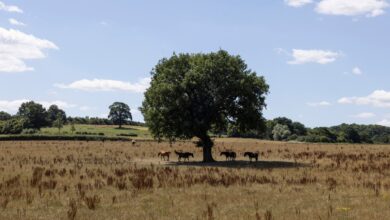Church wades into water pollution row as anger grows over government inaction

Amid growing public outrage over the mismanagement and pollution of the UK’s watercourses and beaches, several churches and even a Cathedral along the banks of the River Wye are taking a leading role in a protest calling for action.
Billed as a “river pilgrimage” the protest has seen a carved wooden statue of the Virgin Mary floated down 75 miles of the Wye – the fourth longest river in the UK – from Hay-on-Wye, to Monmouth.
Church bells have been rung and choirs have sung as the statue – Our Lady of the Waters and the Wye – has passed by, carried aloft by two canoes.
In a 900-year-old church, monks have performed gregorian chants in support of the protest, and picnics, prayers, cakes and a feast have all been part of the week-long action to highlight the plight of the river.
Sewage, waste from chicken farms, agricultural runoff and the current drought have combined to take a heavy toll on the river, which last week saw record levels of salmon deaths.
Father Richard Williams from St Mary’s Church, Hay-on-Wye, came up with the plan for the protest, along with the sculptor of the statue, Philip Chatfield.
“I naturally and instinctively wanted to do something,” Father Williams told The Independent.
“How can you claim to give worth to the invisible if you’re not celebrating the worth of that which is very visible and very loved?”
“There’s been a most wonderful response. A very sweet response to the whole thing. I’ve been very moved by it all really,” he said.
Asked why so many members of the Church had become involved with the protest he said: “It’s right that the Church should be involved in these things because nothing beautiful is wasted on God, and therefore if we worship God then nothing beautiful should be wasted on us.”
On Tuesday the protest landed at Hereford Cathedral where the statue was processed through the cloisters before an evensong service attended by protesters.
Reverend Neil Patterson, the Bishop of Hereford’s acting chaplain and secretary of the River Wye Preservation Trust, told The Independent the protest “is important because there is pretty much universal recognition that none of our rivers are in great health”.
“The Wye in particular has always been known as a river of great natural beauty and historically, of remarkably unspoilt natural beauty, which is sadly no longer the case.
“As Christians, we have a particular duty to care for the good world that God gave us. To treat it as a gift to be tended, and not, as it were, a possession to be used purely for our own benefit.”
He added: “It’s easy to start demonising one group and say ‘oh it’s all the farmers’ fault’, or ‘it’s all the water companies’ fault’, it’s actually a very complex problem. In a way this is the nature of all our environmental care issues – all of our habits, what food we buy, the way we travel, have an impact, and we’ve all got to work together to make a difference.”
Rachel Jenkins, a local campaigner, who put the itinerary together for the protest told The Independent the conditions in the river have led to a “shocking crash in biodiversity”.
“There are several problems with the Wye,” she said citing sewage being discharged by water companies and slurry and fertiliser run-off from farms that washes into the river. “The Wye gets 3,000 tonnes of phosphates a year from these three sources, and it can only really take 300.”
She said the current drought and recent heatwave meant “everything has become more concentrated”.
“The water heats up and causes a lack of oxygen. The excess phosphates cause algal blooms which asphyxiate the insects and the fish. And the fish need the insects to feed on.”
The statue nears Ross on Wye on Thursday





